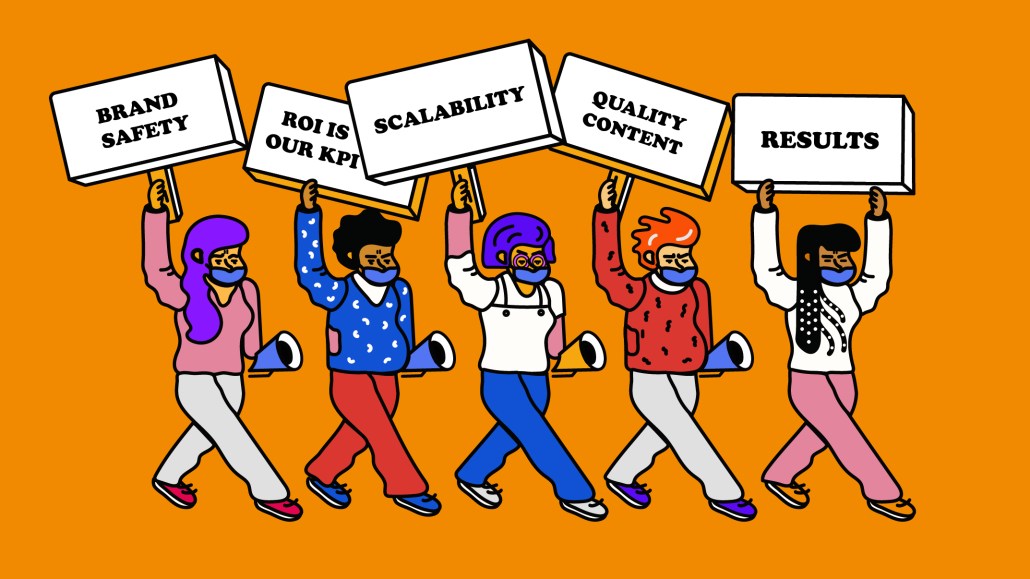Secure your place at the Digiday Media Buying Summit in Nashville, March 2-4
Pernod Ricard thinks the Facebook advertiser revolt won’t be enough to curb hate speech online, so it’s developing an app to help

Pernod Ricard may have pulled its media dollars from Facebook for the month of July, but U.S. CEO Ann Mukherjee doesn’t think a boycott will be enough to push the social network to make any lasting change to how it moderates content. After all, large advertisers like Pernod Ricard account for just a fraction of Facebook’s total ad revenue. In fact, Pernod Ricard spent $2.4 million in ads on the platform last year, according to analytics firm Pathmatics.
It’s why the alcohol business is developing an app that will allow people to report hate speech they see online. Pernod Ricard will then flag the content with the respective media owner or social network so that it can be reviewed and removed if warranted. In doing so, the app aims to bring more transparency to how social networks moderate hate speech by showing those who report it what is and isn’t deemed bad enough to be removed.
Often, the likes of Facebook and YouTube will say they have removed content, but there’s little transparency into what they’ve removed and how they’ve done it, said Mukherjee. The hope is for other advertisers and social networks to back the project so that it becomes a cross-industry project maintained and promoted by many stakeholders.
“We need to use our influence as advertisers to hold the social media platforms more accountable to how they take down hate speech so that it becomes a more transparent process,” said Mukherjee who Digiday caught up with to hear more about why Pernod Ricard is going beyond the boycott to tackle hate speech on the social network and ask how the company is setting itself up to meet new expectations from society.
Why develop an app when other companies are withholding money from social networks?
We respect the boycott. We’ve paused paid campaigns on all the social networks we use throughout July. The boycott has created momentum around the issue of hate speech online, but what happens on August 1? By creating the app, we wanted it to be additive to the boycott by finding a way to make the way these platforms deal with hate speech more transparently. As advertisers, we need to be better at getting the social media platforms to live up to what they say they’re going to do.
How will the app make it easier to see how social networks moderate hate speech?
There are these factions forming around hate speech and what we don’t know is whether these social media platforms are actually picking up these groups and choosing not to take them down. But if a consumer does see a hate speech faction they can use the app to flag it an then ask the social network they saw it on why it’s not been taken it down. The app won’t make a judgment on whether something is hate speech or misinformation. It will, however, provide some transparency around why a social media platform decides to either take that post down or leave it up.
Are you using the time away from social media to think harder about the content you fund?
We’re the companies funding these social media platforms with hate speech on them so we accept that people could say we’re culpable too. It’s time for us as an advertiser to take that seriously. Yes, we are thinking about how to be more ethical with our spending. If a consumer tells us we’re associated with something that goes against our own company values then that’s not a place where we’re going to run ads on again.
How does that ethical approach impact the way you plan campaigns?
The traditional way of targeting demographics is of yesteryear. People are multi-dimensional. We live in a world of advanced behavioral economics. And we’re advancing our efforts here to think about how we market our brands to people based on our understanding of how they behave in certain occasions. If someone is at home by themselves they behave differently to how they are with friends, regardless of the color of their skin. Those learnings form the basis of how we then create content and then find the media to reach them in ways that are fundamentally different to the traditional approach.
More in Media

From feeds to streets: How mega influencer Haley Baylee is diversifying beyond platform algorithms
Kalil is partnering with LinkNYC to take her social media content into the real world and the streets of NYC.

‘A brand trip’: How the creator economy showed up at this year’s Super Bowl
Super Bowl 2026 had more on-the-ground brand activations and creator participation than ever, showcasing how it’s become a massive IRL moment for the creator economy.

Media Briefing: Turning scraped content into paid assets — Amazon and Microsoft build AI marketplaces
Amazon plans an AI content marketplace to join Microsoft’s efforts and pay publishers — but it relies on AI com stop scraping for free.








